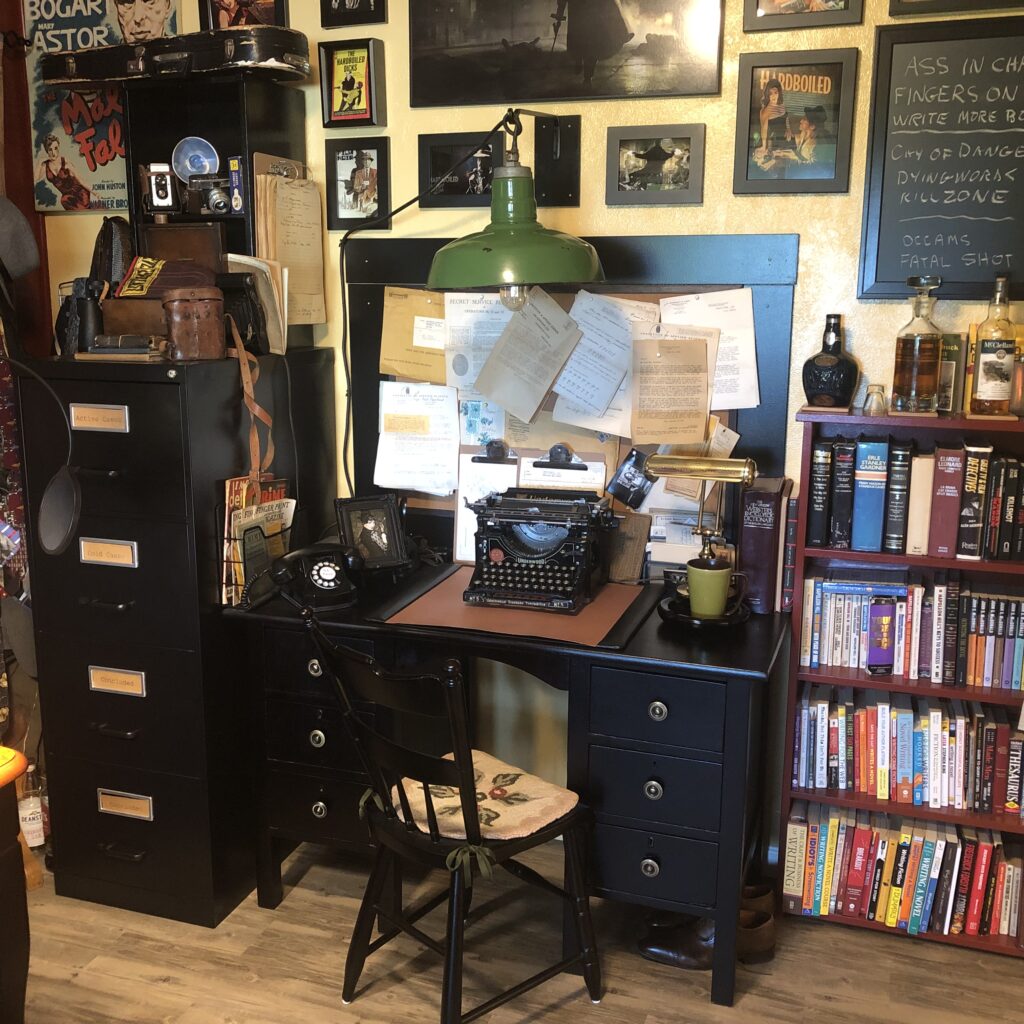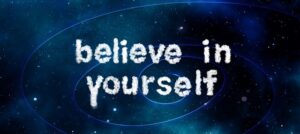Writer’s block.
I had writer’s block.
I’d sat down, opened a blank page, and stared at the screen. I’d realized, on short notice, that I had a Kill Zone post due the next morning and it was four in the afternoon. I knew I had limited time to do a decent job as I skipped through my Kill Zone idea list.
Storytelling in Totem Poles Nope, too long. The Pareto Principle for Writers Same. Uh-uh. Multi-Tasking vs Mono-Tasking Can’t do it justice. The Psychology of Neckties for Homicide Investigators. Not today. Neurodivergent Authors Phhh… Sturgeon’s Law of 90% Not possible. Do You Read Your Reviews? Naw. Effective Book Covers with Elle J. Rossi Geeze, I haven’t even started Elle’s questionnaire.
I sat with the blank page open, leaned back, and looked around my writing room for alternative ideas. My space is full of sayings for stimulus as well as tchotchkes for mindset and motivation. I’m a big believer in the muse, and my muse (since rehab) shows up sober, dressed, and ready to help when required.
Not this afternoon.
I got up and searched for a topic I could bang out fast and still provide value to whomever might so read. Nothing came. Yet I knew it was out there—not far out there—actually very close by.
I’m a nostalgist… if there is such a word. I have a nostalgic yearn for things old and bygone. Like the 1920s, for instance. Part of my studio is set up like a 1920s private detective office. (See the pic)

It’s got authentic props or tchotchkes like a rotary phone, an Underwood No. 5 typewriter in perfect working condition, a suspended metal warehouse lamp with a brown Edison bulb, a blown-glass ashtray and a fired-clay, Sears Roebuck coffee cup dated 1924, a corkboard pinned with relevant stuff, and a framed photo of some floozie who’s my idea of the perfect femme fatale.
Above and to the left are other motivational tchotchkes to set the mindset. A 1920s Electrohome tube radio that sort of works. (I can only dial a Vancouver traffic station on it, and I promise you the zoo-on-wheels in this place is not like a calm and orderly ‘20s road.) A bunch of flash cameras. Leather-cased binoculars. A violin case containing a Thompson .45 machine gun, or at least a reasonable facsimile. A prized, original silkscreen Maltese Falcon movie poster. And vintage neckties. I swear I have 500 ties, and there’s a profound psychological secret for that which I’ll reveal to you in some future piece.
I sat at my 2020s workstation and stared at the screen. Nothing was on it. I looked to my left at three framed affirmations I read every morning. One is deeply personal, and it reflects why I do this stuff. Words like financial, sense of purpose, sense of accomplishment, recognition, learning, opportunity, and legacy—leaving something behind when I’m gone.
The second affirmation is a quote on commitment by Johan Wolfgang von Goethe that’s supposed to bust through the ice of writer’s block like a massive polar bear snatching a fat little seal. It mentions Providence moving when one commits. But this afternoon, it appeared Providence was working at St. Elsewhere.
My third framed factoid is The Muse from Stephen King in On Writing. I won’t bore you with the entire thing ‘cause most of you writers know it by heart. I re-read it for the second time this day and came to the guy with the cigar and the little wings has a bag of magic part.
“Come on, buddy. Open the bag, man.” I said it out loud. “Help me out, O Twisted One.”
And then it happened. Out of nowhere, my muse said, “Just write about what you’re seeing around you and thinking in the moment. Experiencing. Call it Mindset, Motivation, and Tchotchkes or something like that.”
So, this post appeared, and it took me under an hour.
I’m a big believer in mindset, motivation, and tchotchkes. I think my muse pulled something of value from the magic bag and got its point across this afternoon, but I’d like to leave you with something from hardboiled & noir crime writer, Megan Abbott. She said this in a CrimeReads Shop Talk interview:
“Tchotchkes are stuff I look at to stimulate my imagination. When I look at all the tchotchkes above and around my desk—it’s weird. Writing is weird. You have to trust that you’re going to create this mental path so that readers can tunnel into your brain and experience this thing. So, for me, that’s really weird on its own. Deep down, though, I know I need discipline, mindset, and motivation in order to produce. Tchotchkes help me do that.”
Kill Zoners—Does this ring true to you? Do you have certain props or tchotchkes to help stimulate your imagination? Please share how you get into the right mindset and get motivated.

BTW, tchotchke is pronounced ‘chach-kee”. Sort of how a New England crime writer 😉 would say “church key”.

 The word “success” has various meanings. Some writers stay laser-focused on the end result, but I propose that we step back, slow down, and view success as footprints in the sand. Each footprint represents one day.
The word “success” has various meanings. Some writers stay laser-focused on the end result, but I propose that we step back, slow down, and view success as footprints in the sand. Each footprint represents one day.